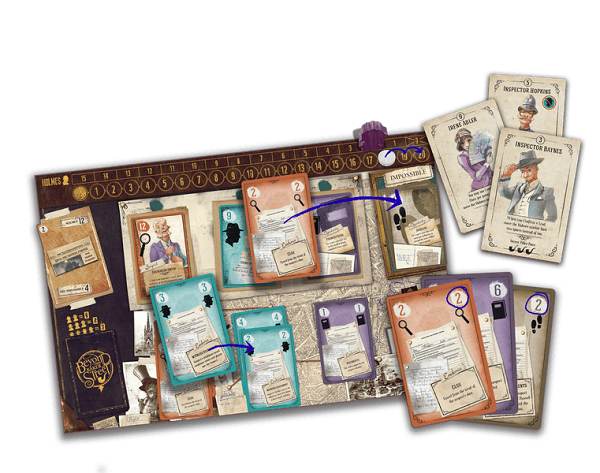Playing Beyond Baker Street: It’s Elementary, My Dear Watson

Work together to solve the case before Holmes beats you to it! Find the suspect, motive, and opportunity to tie up the case before you run out of time.
Much like Hanabi, Beyond Baker Street is a cooperative card game in which players can only see their opponents’ cards and not their own. Work together to help each other figure out which cards to play in order to crack the case.
Gameplay
A case file is selected to solve. This sets the difficulty of the game by selecting the space on his track that Holmes starts the game on.
In order to solve the case, you must confirm the suspect, motive, and opportunity. For each of these three categories, you deal three cards from their respective decks face-down onto their designated spaces on the board. These are the leads. You then turn the top lead card of each pile face up. Each card will belong to one of four colors, and show a number.
Each player is dealt a certain number of cards based on player count. You hold your cards so that you can only see the backs of them while the other players can see their fronts. Each card will have a value and a color.
Players are working together to solve the case. On your turn, you may perform one action. When you perform an assist action, you move Holmes forward one space on his track, and you can then point to all the cards in another player's hand that share a number or a color, and announce what that color or number is. Alternatively, on your turn you can play an evidence card to one of the leads. The goal is to eventually have the total value of all the cards played there equal the value on that lead card. If, when you play a card, it causes the total value to exceed the lead's, you instead add the new card face-down to the impossible pile on the board, the lead you were playing to is discarded, the next one is drawn, and all cards that were played to that lead are shuffled back into the deck. If you play a card whose color does not match the lead, then it's value is added to that lead's value, increasing the target number you must hit to solve that lead.
If the value of the cards played to a lead adds up to the correct number, you can instead perform the confirm action on your turn, to lock in that lead and move Holmes back one space. Another action allows you to play one card face up to the impossible pile. In order to win the game, the total value of face-up cards in the impossible pile must equal exactly twenty (if you exceed that value, you lose the game). The case file you choose at the start of the game determines how many cards are allowed to be present in the impossible pile. If you exceed that number, you lose.
The final action you can select on your turn is pursue, which allows you to discard one of the three lead cards you are currently working on, and draw a new one. However, if the last lead card of any of the three decks is ever discarded, the players lose the game.
If the value of cards in the impossible pile reaches twenty, and you confirm all three types of leads before Holmes reaches the end of his track, you win the game.

Review
Beyond Baker Street has a lot in common with games such as Hanabi but its theme and mechanics helps to set it apart, both in the story it’s telling and by adding an extra element to the puzzle. You’re not just trying to play cards in the correct order, but trying to figure out how to combine them with other people’s cards to add them up to the correct values. This can be challenging and adds more variety to the game as the puzzle varies more often. A card that might be useful now can lose its value if someone else plays one of their cards before your turn comes around.
The game has great player interaction, with figuring out how each other’s minds work and when someone is likely to give a clue and in what circumstances, so that you can glean more information from what they’re saying. It also plays pretty fast, while the artwork and components of the game both look attractive and fit in nicely with the game’s theme.
There’s a lot of ability to control the difficulty based off the case file you select, and there is also a variant in which each player is dealt a character at the start of the game, each of whom comes with different abilities that can both help and hurt players and can be used to adjust the difficulty still further.
This is a more complicated game to teach than Hanabi and it’s less accessible to new players, as there’s no scoring system that gives you points even if you don’t make it to the end. Here there are multiple ways to lose and you’re going to do it a lot. But it’s challenging, really satisfying when you win, and is based on a very enjoyable and popular theme.
Pros: Variety in the puzzle, multiple ways to control difficulty, theme, player interaction
Cons: Lots of ways to lose can frustrate some players, less accessible than similar games






